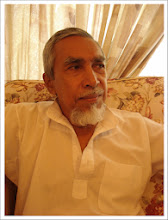1. At the beginning of 1911 my
father had apparently detached himself from the Noordin clan
as well as friends and relatives in Penang to pursue a career in the civil
service in Alor Star, Kedah. It seemed that he was not interested in inheriting
the family business for one reason or another. It was not by virtue of his
lineage that he was able to make a name for himself as an important civil
servant away from his home town. I believe it was hard work and determination.
2. I guess my father was on the
ball at all times. Just as he assumed the post of Headmaster of GES, he was called upon to work in the Census Office as Chief Clerk. So the
school was closed for about three months to allow him to complete his task at the Census Office. It was reported that
he “worked indefatigably as Chief Clerk at tabulating the results (of the census)
and showed considerable skill in controlling a large staff of clerks.”
3. About two years later, he was appointed Senior Auditor, North
Kedah. I suppose he might have been thrown in at the deep end. He had many
years of experience as a teacher in English education behind him, but I can’t
say about his aptitude for number crunching. However, on account of his
responsiveness I guess that it did not take him long to learn the robes.
4. I believe my father was a
determined person. During his time as Registrar of High
Court, the Court of Appeal was on the point of being implemented. It seemed
that he was behind the preparation of its inauguration. In this regard, I suppose I
should uphold his written account and give him the benefit of the doubt.
According to him, while he was in the Registry he was “largely responsible for
every preparation concerning the inaugural of the Court of Appeal which went
off without any hitch and tacitly met with the approval of the Judges of the
said Court.” Furthermore, he asserted that all the records of the appeals had
to be done in two languages which he did single-handed and within very short
notice.
5. It seems curious
that something which happened earlier in 1911 would recur in 1922 when he was appointed
to the post of Assistant Superintendent Monopolies and Customs. Almost at the
same time he was
appointed to carry out the work of special Translator of Enactments. The translation work seemed taxing as he had his work cut out for him, but being responsive
he had to burn the candle at both ends. Subsequently, the difficult situation
was resolved in his favour. In a letter to the Under Secretary to Government
regarding his translation work, he stated matter-of-factly: “… I must request
that Govt. will make a special allowance for such hard work.” He was
remunerated for every translation that he accomplished.
6. Coming from a well-to-do family,
it seemed that his life in George Town might have been a far cry from that in
Alor Star. He might have been quite well off in his
home town. It was not
known what his salary was at PFS, but he was paid $100 rial a month upon
being appointed Headmaster of GES.
7. He seemed to be particularly concerned about money during his
first decade in Alor Star. Apparently, this could mean that he had no source of
income other than his job. This accounted for his occasional requests for improved
allowance and salary or for special allowances and salary increments. For
instance, as early as 1913 he had asked for a $15 rial increase in housing allowance.
His other applications included salary increase, a scheme for senior auditor, and
even a rickshaw allowance.
8. In
order to improve his status, my father would apply for promotion when it was high
time that he did. Being a down-to-earth individual, he would emphasise on his
own merits in every application letter. Actions speak louder than words. Accounts
of his achievements in the letters would be worthless if they were not
substantiated by actual actions. In fact, it was his actions that had enhanced
his application for promotion
with favourable recommendations. He climbed to Class IV in 1919 and later to
Class III in 1924. His post before retirement was Acting 2nd. Under Secretary to Government, an appointment in Class II
of the KCS.










